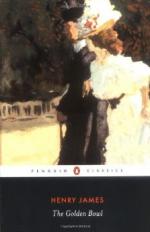her all blurred and dim. The high voice went
on; its quaver was doubtless for conscious ears only,
but there were verily thirty seconds during which
it sounded, for our young woman, like the shriek of
a soul in pain. Kept up a minute longer it would
break and collapse—so that Maggie felt
herself, the next thing, turn with a start to her
father. “Can’t she be stopped?
Hasn’t she done it enough?”—
some such question as that she let herself ask him
to suppose in her. Then it was that, across half
the gallery—for he had not moved from where
she had first seen him—he struck her as
confessing, with strange tears in his own eyes, to
sharp identity of emotion. “Poor thing,
poor thing”—it reached straight—
“Isn’t she, for one’s credit,
on the swagger?” After which, as, held thus
together they had still another strained minute, the
shame, the pity, the better knowledge, the smothered
protest, the divined anguish even, so overcame him
that, blushing to his eyes, he turned short away.
The affair but of a few muffled moments, this snatched
communion yet lifted Maggie as on air—so
much, for deep guesses on her own side too, it gave
her to think of. There was, honestly, an awful
mixture in things, and it was not closed to her aftersense
of such passages—we have already indeed,
in other cases, seen it open—that the deepest
depth of all, in a perceived penalty, was that you
couldn’t be sure some of your compunctions and
contortions wouldn’t show for ridiculous.
Amerigo, that morning, for instance, had been as absent
as he at this juncture appeared to desire he should
mainly be noted as being; he had gone to London for
the day and the night—a necessity that
now frequently rose for him and that he had more than
once suffered to operate during the presence of guests,
successions of pretty women, the theory of his fond
interest in whom had been publicly cultivated.
It had never occurred to his wife to pronounce him
ingenuous, but there came at last a high dim August
dawn when she couldn’t sleep and when, creeping
restlessly about and breathing at her window the coolness
of wooded acres, she found the faint flush of the
east march with the perception of that other almost
equal prodigy. It rosily coloured her vision
that—even such as he was, yes—her
husband could on occasion sin by excess of candour.
He wouldn’t otherwise have given as his reason
for going up to Portland Place in the August days
that he was arranging books there. He had bought
a great many of late, and he had had others, a large
number, sent from Rome—wonders of old print
in which her father had been interested. But
when her imagination tracked him to the dusty town,
to the house where drawn blinds and pale shrouds, where
a caretaker and a kitchenmaid were alone in possession,
it wasn’t to see him, in his shirtsleeves, unpacking
battered boxes.




